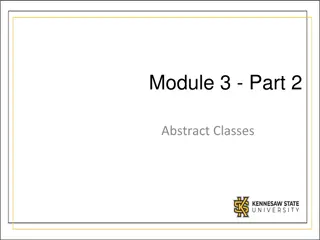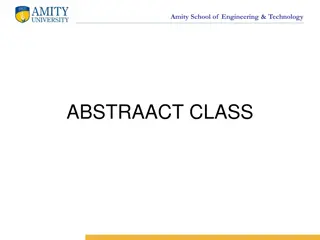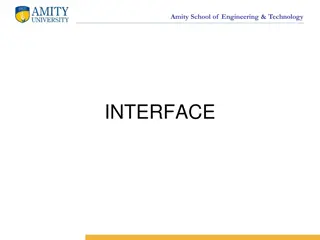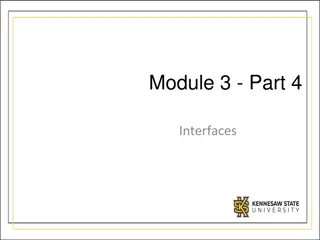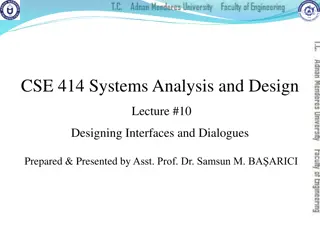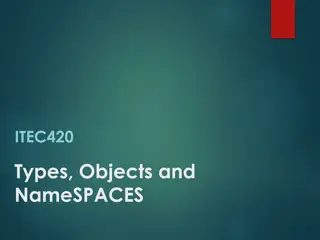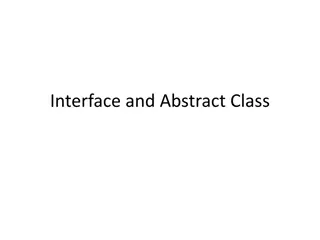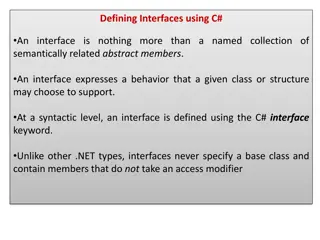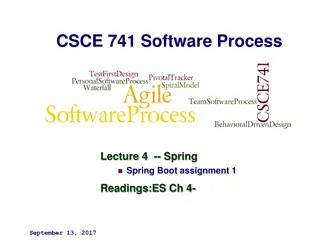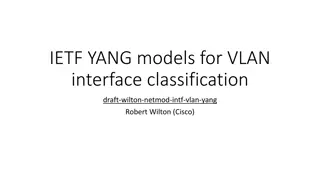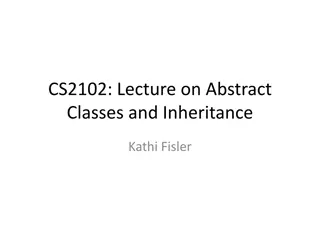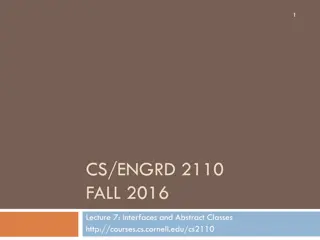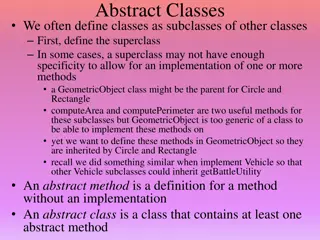Understanding Interfaces and Abstract Classes in CS/ENGRD 2110 Spring 2016
Explore the concepts of interfaces and abstract classes in the context of computer science with a detailed examination of their characteristics, implementations, and extensions. Learn how classes implement interfaces, utilize interface methods, and extend other interfaces to enhance functionality in programming. Delve into examples such as IntRange and List to grasp practical applications of these fundamental concepts.
Download Presentation

Please find below an Image/Link to download the presentation.
The content on the website is provided AS IS for your information and personal use only. It may not be sold, licensed, or shared on other websites without obtaining consent from the author. Download presentation by click this link. If you encounter any issues during the download, it is possible that the publisher has removed the file from their server.
E N D
Presentation Transcript
1 CS/ENGRD 2110 SPRING 2016 Lecture 7: Interfaces and Abstract Classes http://courses.cs.cornell.edu/cs2110
Announcements 2 Attendance for this week s recitation is mandatory! A2 is due Wednesday Get started on A3 do one method a day
Overview 3 Big Demo! Interfaces Abstract Classes Normal Classes vs. Abstract Classes vs. Interfaces
Interfaces Interfaces cannot by newed! 4 New keyword /** A mutable collection of E values */ publicinterface Collection<E> { /** Return true if this collection contains elem*/ boolean contains(Object elem); Always public /** Ensure that this contains elem. * Return true if the collection is changed by this. */ boolean add(E elem); } No constructors! No No fields! implementations!!!
Implementing Interfaces 5 Classes implement interfaces /** A range of integers that always includes 0 */ publicclass IntRange implements Collection<Integer> { private int min = 0; // Represents the range min..max private int max = 0; // min <= max /** Return true if elem is an integer in the range. */ publicboolean contains(Object elem) { } /** Minimally extend the range to include elem. * Return true if the range had to be extended. */ publicboolean add(Integer elem) { } } Provides implementations for interface methods
Using Interfaces 6 /** Returns whether the collection contains every * integer between and including min and max. * Precondition: ints is not null */ publicstatic boolean containsRange( Collection<Integer> ints, int min, int max) { for (int i = min; i <= max; i++) if (!ints.contains(i)) return false; return true; } Because ints has type Collection<Integer>, you can use any method declared in the Collection<Integer> interface. Works on any Collection!!! This includes your own DLinkedList from A3! Interfaces are types
Extending Interfaces 7 Interfaces extend other interfaces /** A mutable indexed list of E values */ public interface List<E> extends Collection<E> { int size(); // return size of the list E get(int index); // return elem at index E set(int index, E elem); // change elem at index boolean add(int index, E elem); // insert elem at index E remove(int index); // remove and return elem at index } Implicitly includes all methods in Collection<E>
Outdated use of abstract classes! - see next slide on defaults Abstract Classes 8 /** Provides default implementations for list methods */ public abstract class AbstractList<E> implements List<E> { public abstract int size(); public abstract E get(int index); public abstract E set(int index, E elem); public abstract boolean add(int index, E elem); public abstract E remove(int index); public boolean add(E elem) { return add(size(), elem); } public boolean contains(E elem) { for (int i = 0; i < size(); i++) if (!Objects.equals(elem, get(i))) returnfalse; returntrue; } } Abstract classes cannot be newed Indicates that subclasses are responsible for providing the implementation Only abstract classes can have abstract methods
Defaults in Java 8 9 /** Provides default implementations for list methods */ public interface List<E> extends Collection<E> { int size(); E get(int index); E set(int index, E elem); boolean add(int index, E elem); E remove(int index); default boolean add(E elem) { return add(size(), elem); } default boolean contains(E elem) { for (int i = 0; i < size(); i++) if (!Objects.equals(elem, get(i))) returnfalse; returntrue; } } Indicates that the interface is providing a default implementation for this method
Abstract Classes Revisited 10 public abstract class IntExpression { private Integer value = null; public int evaluate() { if (value == null) value = eval(); return value.intValue(); } protected abstract int eval(); } public class Zero extends IntExpression { protected int eval() { return 0; } } public class Sum extends IntExpression { protected IntExpression left, right; publicSum( ) { } protected int eval() { return left.eval() + right.eval(); } } Abstract class provides common fields and functionality Abstract class leaves critical methods abstract for subclasses to implement Subclasses provide case-dependent implementations
Comparison 11 Normal Classes Abstract Classes Interfaces Features can be used as types and in casts can be newed have constructors can have fields can provide method implementations can have non-public methods can have abstract methods can be inherited multiply


